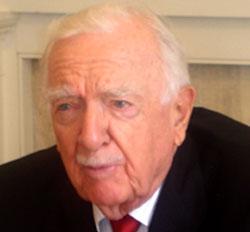My eye was caught by this story in today’s Irish Times.
The Government lost a vote in the Seanad [i.e. the second chamber of the Irish parliament] yesterday on the Defamation Bill but managed to salvage the legislation by calling for a walk-through vote which gave enough time for two missing Senators to be found.
The Government defeat came on an amendment to the Bill proposed by Senator Eugene Regan of Fine Gael proposing to delete the provision in the legislation making blasphemy a crime.
In an electronic vote whereby Senators press a button, the Government was defeated by 22 votes to 21 in the 60-member upper house.
However, Fianna Fáil whip Diarmuid Wilson immediately requested a walk-through vote which takes about 10 minutes to complete. In that period two Senators, Geraldine Feeney of Fianna Fáil and Deirdre De Búrca of the Green Party, had time to get to the chamber and the amendment was defeated by 23 votes to 22. The Bill itself was then passed by the same margin.
A Green Party spokesman said Ms De Búrca was initially absent through “a misunderstanding” while showing a trade union delegation from Colombia around Leinster House. Ms Feeney was at the dentist.
What, one wondered, was all that about? Deeper in the paper there was a rather good OpEd piece by Michael Nugent, which explained some of the background.
The Constitution says that blasphemy is an offence that shall be punishable by law. That law currently resides in the 1961 Defamation Act. Because he was repealing this Act, Ahern [Minister for Justice] said he had to pass a new blasphemy law to avoid leaving “a void”.
But this “void” was already there. In 1999, the Supreme Court found that the 1961 law was unenforceable because it did not define blasphemy. In effect, we have never had an enforceable blasphemy law under the 1937 Constitution.
After several retreats, Ahern claimed both that he had to propose this law in order to respect the Constitution, and also that he was amending it to “make it virtually impossible to get a successful prosecution”. How is that respecting the Constitution?
This type of “nod and wink” politics brings our laws, and our legislature, into disrepute. In practice, we cannot be certain how our courts will interpret unnecessary laws, as we discovered after the abortion referendum.
Also, the matter might be taken out of our hands. In 2005, the Greek courts found a book of cartoons to be blasphemous, and issued a European arrest warrant for the Austrian cartoonist who drew them. This can be done if the same crime exists in both jurisdictions.
Instead, we should remove the blasphemy reference from the Constitution by referendum. Many independent bodies have advised this, including the Council of Europe in a report last year co-written by the director general of the Irish Attorney General.
We could do this on October 2nd, the same day as the Lisbon referendum. It could be the first step towards gradually building an ethical and secular Ireland. We should be removing all of the 1930s religious references from the Constitution, not legislating to enforce them.
Hmmm… It’s a long time since I read the said Constitution, so I dug it out. Here’s an extract from the preamble:
In the Name of the Most Holy Trinity, from Whom is all authority and to Whom, as our final end, all actions both of men and States must be referred,
We, the people of Éire, Humbly acknowledging all our obligations to our Divine Lord, Jesus Christ, Who sustained our fathers through centuries of trial,…
Article 6 states:
All powers of government, legislative, executive and judicial, derive, under God, from the people, whose right it is to designate the rulers of the State and, in final appeal, to decide all questions of national policy, according to the requirements of the common good.
Article 40 states, in part:
The publication or utterance of blasphemous, seditious, or indecent matter
is an offence which shall be punishable in accordance with law.
Article 41 is even wierder:
1° The State recognises the Family as the natural primary and fundamental unit group of Society, and as a moral institution possessing inalienable and imprescriptible rights, antecedent and superior to all positive law.
2° The State, therefore, guarantees to protect the Family in its constitution and authority, as the necessary basis of social order and as indispensable to the welfare of the Nation and the State.
1° In particular, the State recognises that by her life within the home, woman gives to the State a support without which the common good cannot be achieved.
2° The State shall, therefore, endeavour to ensure that mothers shall not be obliged by economic necessity to engage in labour to the neglect of their duties in the home.
3. 1° The State pledges itself to guard with special care the institution of Marriage, on which the Family is founded, and to protect it against attack.
Article 44 states:
The State acknowledges that the homage of public worship is due to Almighty God. It shall hold His Name in reverence, and shall respect and honour religion.
It’s enough to make one feel sympathetic towards the ‘Reverend’ Ian Paisley. This isn’t the constitution of a modern, pluralist, secular state, but of a priest-ridden, superstitious, misogynistic and backward statelet.


